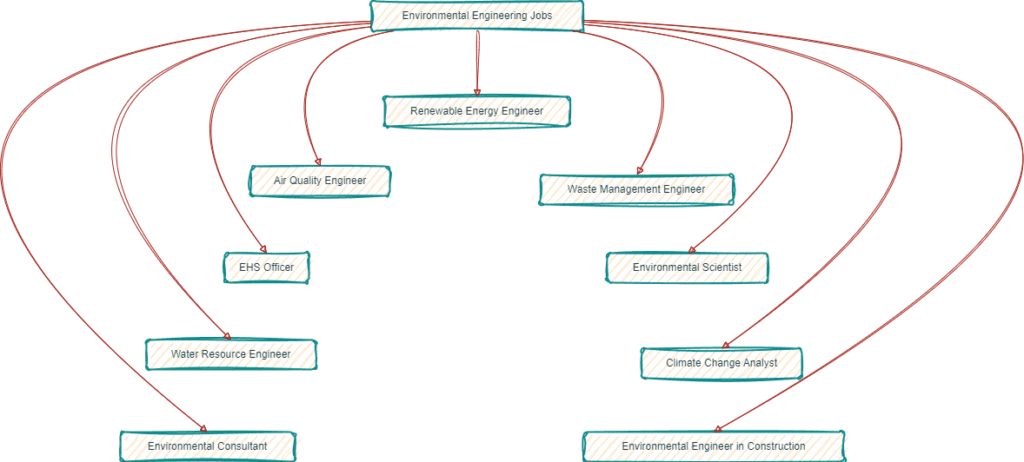7 High-Paying Jobs You Can Land with an Environmental Engineering Degree (You Don’t Want to Miss This!)

Ready to Take Your Environmental Engineering Degree to the Next Level?
If you’ve recently graduated with a degree in environmental engineering, you might be wondering what exciting, high-paying careers await you. The opportunities are vast, varied, and incredibly rewarding. According to the U.S. Bureau of Labor Statistics, the median annual wage for environmental engineers was $92,120 in 2020. But that’s just the beginning. Let’s explore some of the most lucrative and impactful roles you can pursue.
1. Environmental Consultant: The Go-To Expert for Sustainability
Are You the Expert Companies Need?
As an environmental consultant, you’ll advise businesses on how to navigate complex environmental regulations and implement sustainable practices. Your role is crucial in helping them minimize their ecological footprint and comply with legal requirements.
Why It’s Exciting
You’ll work with a variety of industries, from construction to energy, providing tailored solutions that drive significant environmental improvements. This diversity keeps the job dynamic and fulfilling.
What’s in It for You?
According to Glassdoor, environmental consultants can earn an average salary of $68,000 per year, with experienced professionals making well over $100,000.
Take Action Now
To thrive as an environmental consultant, focus on building your expertise in environmental regulations and sustainability practices. Consider certifications like LEED or ISO 14001 to boost your credentials and make yourself indispensable.
2. Water Resources Engineer: Optimize Our Most Vital Resource
Could You Be the Water Management Pro We Need?
Water resources engineers are essential in managing and optimizing water supply systems. They design solutions for water treatment, flood control, and irrigation, ensuring that our most vital resource is used efficiently and sustainably.
Why It’s Important
With global water scarcity affecting over 2 billion people (World Health Organization), your work can make a significant impact on communities and ecosystems.
The Financial Reward
According to PayScale, the average salary for a water resources engineer is around $69,000, with potential earnings exceeding $100,000 for senior positions.
Get Started
Specialize in hydrology and water management. Gain hands-on experience through internships or co-op programs, and consider certifications in water treatment to enhance your job prospects.
3. Environmental Health and Safety Manager: Protect People and the Planet
Are You a Safety Champion?
Environmental health and safety (EHS) managers develop and implement policies to ensure workplace safety and environmental protection. They conduct risk assessments, train employees, and ensure compliance with health and safety regulations.
Why It Matters
The role is pivotal in preventing workplace accidents and environmental incidents, making it highly impactful and respected within organizations.
What’s the Payoff?
According to Indeed, EHS managers can earn an average salary of $85,000 per year, with top earners making over $120,000.
Your Next Steps
Develop expertise in occupational health, safety regulations, and risk management. Certifications like Certified Safety Professional (CSP) or Certified Industrial Hygienist (CIH) can be advantageous.
4. Sustainability Specialist: Drive Corporate Responsibility
Are You Ready to Lead Sustainability Initiatives?
Sustainability specialists help organizations develop and implement sustainability initiatives. They focus on reducing waste, improving energy efficiency, and promoting sustainable practices.
Why It’s Rewarding
You’ll play a key role in helping companies become more environmentally responsible, which is increasingly important to consumers and stakeholders.
The Salary
According to GreenBiz, sustainability specialists can earn between $60,000 and $90,000 annually, with higher salaries for senior positions.
How to Get There
Build a strong foundation in sustainability principles and corporate social responsibility. Consider certifications in sustainability reporting or renewable energy to enhance your qualifications.
5. Environmental Engineer: Design Solutions for a Greener Future
Do You Want to Create Change?
Environmental engineers design systems and solutions to address environmental challenges. They work on projects related to air and water pollution control, waste management, and environmental remediation.
Why It’s Critical
Your work will directly contribute to cleaner air, safer water, and reduced waste, making a tangible difference in the environment.
The Financial Reward
According to the U.S. Bureau of Labor Statistics, the median annual wage for environmental engineers is $92,120, with top earners making over $144,000.
How to Excel
Focus on gaining experience in environmental engineering projects, including site assessments and remediation plans. Obtaining professional licensure as a Professional Engineer (PE) can significantly boost your career prospects and earning potential.
6. Renewable Energy Engineer: Power the Future
Are You Ready to Innovate in Renewable Energy?
Renewable energy engineers are at the forefront of developing sustainable energy solutions. They work on projects involving solar, wind, hydro, and other renewable energy sources, aiming to reduce reliance on fossil fuels.
Why It’s Exciting
With the global push towards sustainable energy, your work will be crucial in combating climate change and reducing greenhouse gas emissions. You’ll be part of a dynamic field that’s rapidly evolving and growing.
The Salary
According to Energy Jobline, renewable energy engineers can earn an average salary of $85,000, with potential earnings exceeding $120,000.
Take Action
Specialize in renewable energy technologies and gain experience through internships or cooperative education programs. Certifications in specific renewable energy systems, such as solar PV or wind energy, can enhance your job prospects.
7. Environmental Project Manager: Lead Transformative Projects
Are You the Leader We Need?
Environmental project managers oversee projects aimed at improving environmental quality. They coordinate teams, manage budgets, and ensure projects are completed on time and within scope.
Why It’s Important
You’ll be responsible for the success of projects that can have significant environmental and societal impacts, from pollution remediation to habitat restoration.
The Financial Incentive
According to Glassdoor, environmental project managers can earn an average salary of $80,000, with potential earnings exceeding $110,000 for highly experienced professionals.
Your Path Forward
Develop strong project management skills and consider obtaining certifications such as Project Management Professional (PMP) to enhance your qualifications. Experience in environmental engineering projects is also crucial.
Don’t Miss Out on These Opportunities!
The field of environmental engineering is not only rewarding but also offers high-paying, impactful careers. By focusing on your strengths and gaining relevant experience, you can secure a position that not only pays well but also makes a significant difference in the world.
Why You Should Act Now
The demand for environmental engineers is growing as industries and governments focus more on sustainability and environmental protection. Don’t wait – start building your career today and be at the forefront of change.
Your Next Steps
- Identify Your Area of Interest: Whether it’s water management, renewable energy, or project management, find what excites you the most.
- Gain Relevant Experience: Internships, co-op programs, and entry-level positions can provide valuable hands-on experience.
- Pursue Certifications: Enhance your qualifications with relevant certifications in your chosen field.
- Network with Professionals: Join professional organizations and attend industry conferences to connect with potential employers and mentors.
- Stay Informed: Keep up with the latest trends and advancements in environmental engineering to stay competitive in the job market.
By taking these steps, you’ll not only increase your earning potential but also position yourself as a leader in the field of environmental engineering. Start today – the future is in your hands!

